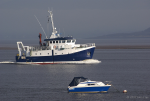Mark-1
Well-Known Member
I'm saying that RAM status can only result from the 'nature of the work she is engaged in', not random misfortunes such as a damaged rudder, nor anything else which unexpectedly occurs, including towing another yacht.
I totally agree that Tillergirl's surveys, for example, are work, albeit unpaid.
I'm pretty close to you on this with the quibble that I think unexpectedly towing probably qualifies as work, even if that wasn't the direct intent of the original legislator.
I've come to the conclusion that the intent behind this rule is to cover working boats doing pre-planned industrial style work (paid or unpaid). Other things may be caught up in the wording but they weren't especially intended.
My guess is the idea of this rule was never that a wide range of vessels should randomly and unexpectedly become RAM. (Unlike "Whoops we've suddenly become NUC", for instance.) In the same way if I find and recover a mine in my Corribee (happens all the time) I didn't become a mine sweeper for 35 minutes. It almost a class of vessel rather than a situation. (Almost, but not, before I get jumped on.)
All of the above my guess, I have no evidence.
I've learned a lot from this thread and I bet I'm not alone. Hitherto I had NUC and RAM as two points on the same graph. If your rudder was a bit stuck you might be RAM if your rudder fell off you'd be NUC. That was totally wrong.
Last edited:



